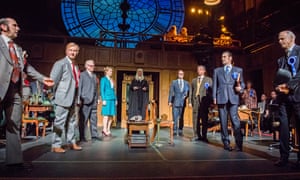The theatres are closed and many of us have been missing live performances terribly. Since the beginning of this pandemic, the National Theatre has been screening live productions of its plays, which has helped me get my fix. It's not the same as being there, but it certainly helps. I hope we all remember the importance of this artistic medium when we are able to face the world again, and that, just as the arts have supported us through this crisis with cultural sustenance, we support them right back with financial assistance.
5 National Theatre Live Productions:
- Frankenstein (2011) - I watched both versions which played in tandem, one with Benedict Cumberbatch playing Dr Frankenstein while Jonny Lee Miller undertook the part of The Creature, and the other one where they swap roles and everything else remains the same. This is more than just a gimmick: BC's Creature is angry and bitter; his Creator deeply troubled, whereas JLM's Creature is more humorous and quizzical; his Creator angry and arrogant. The supporting set, costumes and acting from the rest of the cast are sublime and the experimental steampunk element that director Danny Boyle introduces is a clear forerunner to his Olympic Games Opening Ceremony the following year, with its stark aesthetic and musical underpinning by Underworld.
- One Man Two Guvnors (2011) - I took my parents to see this in London, with a different cast but the same production. It is positively frenetic, and James Corden is a tour de farce. The reverence with which the source material is treated, complete with knowing asides and dollops of dramatic irony make this a great piece of entertainment (director, Nicholas Hynter, dropped it into the middle of a 'serious high-minded season' for light relief). The perfect blend of verbal and physical humour will have them lol-ing in the aisles.
- Present Laughter (2019) - actors are a tricky bunch: they are naturally dramatic but want to be taken seriously. Noël Coward probably knew this more than most, and his depiction of Gary Essendine, a highly-strung bi-polar actor with an entourage, is portrayed with infinite intricacy by Andrew Scott. I tried to find a male noun for a flamboyant person but they all alluded to the individual's sexuality rather than their mental state, and any term for throwing tantrums, being temperamental or emotionally demanding had a female gender bias such as diva or prima donna. According to modern media, male meltdowns are either comedy fodder or concerning spirals into mental illness; Matthew Warchus' contemporary production of this 1940s classic explores this dichotomy from a fresh angle, only occasionally tipping the scales too far in the balance of mania.
- This House (2013) - Party politics can often seem farcical, and so they adapt seamlessly to the stage in this premier production of the timely drama written by James Graham and and directed by Jeremy Herrin. The setting is the turbulent years of 1974-1979 in the UK, when Labour struggled to keep enough numbers in the Commons to pass bills and enact legislation. The tally of members is calculated on an ever-changing chalk board, including people being brought in from their death beds to vote, and promises of bigger offices and newer furniture. The party whips are metres apart in the corridor, and claustrophobically close on stage (while the auditorium doubles as the benches of 'this house' with members emerging from the audience) while they indulge in the literal fisticuffs and petty point scoring more at home in a school playground. It is a building full of bullies, bawdy humour and the fledgling sexism of the 70s, which makes a ripe background for satire and commentary on the class roots of the major parties.
- Twelfth Night (2017) - The Shakespearean play best know for cross-dressing and gender fluidity is an obvious choice for blind casting. Initial reservations at seeing a Malvolia rather than a Malvolio are swiftly overcome by the skill of Tamsin Greig's acting and the sensitivity of Simon Godwin's directing. The twins are well matched through personality with Tamara Lawrance and Daniel Ezra displaying a similar sense of fun, and the Count (Oliver Chris) and Countess (Phoebe Fox) are both a lot more appealing and less pompous than in many productions. The festive element is heightened with party hats and feather boas, but occasionally teeters towards excessive camp. The slick set changes are remarkable, and a fountain on stage is always a highlight.
 |
| Crossing party lines in This House |
 |
| Tamara Lawrance as Viola and Oliver Chris as Orsino in Twelfth Night |


I hated Twelfth Night at school (such cruelty to Malvolio) but I loved this production.
ReplyDelete